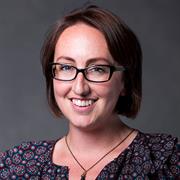Occupational Therapy: Hand and Upper Extremity Rehabilitation Certificate
Spring: Dec 15
Summer: n/a
Part-time (Evenings)
Overview
The Hand and Upper Extremity Rehabilitation certificate program is intended for practicing occupational therapists who would like to gain knowledge in the occupational therapy specialty of hand and upper extremity therapy.
This three-course certificate offers both fall or spring start options.
Program Outcomes
This certificate program is intended for practicing occupational therapists who would like gain knowledge in the occupational therapy specialty of hand and upper extremity therapy. Current Tufts Department of Occupational Therapy students who are interested in this content and practice area are also invited to apply.
Graduates of the certificate program have gone on to earn positions in the most respected hand therapy departments throughout the country. Many report that the Tufts program is what got their “foot in the door” when applying for hand therapy positions. They report that they use the resources from these courses to study for and pass the American Society of Hand Therapists ( ASHT) certification examination, earning the designation: CHT. Others use this advanced study to support clinical laddering and advancement to clinical specialist within their current place of work.
Students who are earning their entry level degree concurrently, are often awarded fieldwork in coveted hand therapy placements.
Application Requirements
- Application Fee
- Resume/CV
- Personal Statement
- Official TOEFL, IELTS, or Duolingo English Test, if applicable
- Transcripts
- One Letter of Recommendation
Tuition & Fees
GSAS bills tuition using a per-credit billing model, meaning you are billed for the number of credits you take each semester. This billing model is used to provide students better flexibility so they may "pay-as-they-go".
| Tuition* | $1,028 per credit |
| Total Credits Required | 9 |
| Enrollment Status | Part-Time: 3-6 credits per semester (typically 1-2 courses) |
Estimating Tuition Costs for this Program
The example pathway below outlines estimated tuition costs per semester using a typical part-time course load. This is one possible pathway to completion; actual credits, costs and degree completion time may vary based on a student’s course load:
| Part-Time Pathway | Fall | Spring | Summer | Total |
| Year 1 | 3 credits | 3 credits | 3 credits | 9 credits |
| $3,084 | $3,084 | $3,084 | $9,252 | |
| Estimated Total Tuition* | $9,252* |
*Estimated based on 2025-2026 tuition rates. Rates are subject to change each academic year. For further information about the full cost of attendance, including health insurance, fees and estimated indirect costs (housing, transportation, etc.), visit Student Financial Services.
Funding Opportunities
While Tufts University does not offer institutional scholarships for certificate programs, we are committed to supporting students as they explore financing options. Additionally, the following opportunities are available:
- City Year Corps members, alumni, and staff are eligible to receive a minimum scholarship award of 25% off tuition.
- There are various work opportunities available for students across Tufts.
- Students interested in exploring possible research pathways or other opportunities may discuss options directly with the Program Director.
Visit our Graduate Financial Aid page for information on loans and financing options.
Faculty

Janet Brooks

Janet Brooks

Nancy Baker

Nancy Baker
Research/Areas of Interest: Chronic Pain, Virtual Reality, Musculoskeletal Health, Ergonomics Nancy Baker's research focuses on ways to mitigate musculoskeletal pain, so people with chronic pain can increase their participation in everyday life. She focuses on three pain mitigation pathways: 1) workstation ergonomics to address work environment properties that propagate pain; 2) improving care delivery in CTS; and 3) virtual reality (VR) as a therapeutic medium for pain. Baker's research is eclectic and uses a variety of tools and techniques to answer her research questions. A new area for her, her current research examines how to implement VR into clinical practice. Here pilot work has looked at what types and dosages of VR are most effective, how different diagnoses, such as chronic back pain or osteoarthritis, respond to VR, and she has partnered with rehabilitation centers to trial different implementation practices. So far, her research consistently demonstrates that VR has a significant effect on pain and that it can be feasibly done by practicing therapists. Some results found a carryover of effect past the immediate VR session. Baker is also working with colleagues to examine new paradigms in carpal tunnel treatment and is completing a trial looking at dosage for standing desk use.

Meredith Grinnell

Meredith Grinnell
Research/Areas of Interest: Current research interests include the use of tele-health technologies and patient participation in healthcare outcomes. Other interests include the use of social media to enhance engagement and communication within the profession as well as with patients.

Jessica Harney

Jessica Harney
Research/Areas of Interest: Rehabilitation Management, Evaluation and Treatment of physical dysfunctions, Evaluation and Treatment of Orthopedic Dysfunctions in the Athlete, Concussion Management and Education, Adaptive Sports as a Rehabilitation Tool Adaptive Sports, Concussion Management of the Athlete and Student, Professional development of the Health-Care Manager

Margaret Morris

Margaret Morris
Research/Areas of Interest: Board Certification in Pediatrics (BCP) 2012-2022, American Occupational Therapy Association Occupational therapy evaluation and intervention in pediatrics, particularly contextual and strengths-based services Pediatrics Evaluation, including strengths-based evaluation, occupation-based evaluation, context & environment Intervention, including models of occupation-based service provision, contextual services, collaboration, strengths-based, least restrictive environment Program development, including systems approaches, strengths-based, mindfulness, social-emotional regulation, physical literacy Teaching and Learning Models of professional development, andragogy, self-regulated learning Project-based learning, technology in teaching and learning, using visual analog scales in course evaluation, concept mapping Online teaching and learning, course design (F2F, hybrid, online)

Ryan Whitney

Ryan Whitney
Research/Areas of Interest: Complex medical pediatric occupational therapy, fieldwork education, professional communication, professional development of emerging occupational therapists, interprofessional collaboration, community-based practice